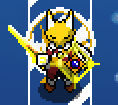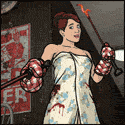|
 The Beginner's Guide is a game released by Davey Wreden, the creator of The Stanley Parable. Davey explains in the introduction to the game that The Beginner's Guide is not actually a game in and of itself, but rather, a collection of games created by someone named Coda. Davey is interested in the themes explored by these games, and invites you to come up with your own interpretations of what they mean as he presents each game in sequence. Due to the nature of the game, I don't think it is intended to be played with any knowledge of what is going to happen other than that. So, if you're interested in experiencing the game from that level of spoiler-free perspective, I invite you to go ahead and play it now, before reading anything else about it. Store page on Steam: http://store.steampowered.com/app/303210/ ...But you're probably a more critical consumer than that, and you may notice from the reviews that this game is very divisive. So I'll do my best to describe it without spoiling too much of it. So is this like a sequel to The Stanley Parable or what? If you played the Stanley Parable and enjoyed it, that information in and of itself is not going to be enough to help you determine if you will like this game. If anything, all it really determines is that, whatever your opinion of The Beginner's Guide is, it's probably going to be more extreme than it would be otherwise. There are ways in which this game is very similar to The Stanley Parable, and ways in which it is not similar at all. To make some general points: The Beginner's Guide is similar to The Stanley Parable in that: - It is a walking simulator with very little opportunity for player interactivity (unless you count story interpretation as player interactivity). - The game explores themes related to the relationship between game designer and game player. - Rather than a single story, the game is more of a collection of short stories, each of which represents the same general message, but approaches that message from different angles. The Beginner's Guide is unlike The Stanley Parable in that: - The game is not funny at all. It can actually be pretty stressful and/or depressing, depending on what you get from the story. - The game is less about video game design specifically and more about the nature of creation in general. - You can't really take anything in the game at face value. What I mean by that last point is that the game deals in themes that are ultimately abstract in nature. Some of the symbolism is obvious immediately, some of it isn't. Once you've been through the full game and have a better idea of what's going on, it puts certain things in a new context, and it makes it clear that there might be more of a "story" going on behind the scenes than was illustrated at first glance. But it's still not necessarily fully clear what that story actually IS; you have to connect the dots yourself, and there's more than one way that the dots can be connected. Actually I have no idea what The Stanley Parable is. Will I like the game? Well, first off, I think The Stanley Parable is a lot easier to get into than this game, so you should at least look it up if you don't already know what it is. If you don't have that as a reference point, though, probably the simplest way I can describe The Beginner's Guide without going over the story is to say this: This is an arthouse game. Full stop. This is a game where you can only figure out what's going on through inferring what's happening, not through watching what's actually happening. This is a game designed less around "fun" and more around "introspective discomfort". This is a game that has no real gameplay to speak of. Okay, but is it worth  ? ?Depends on how much you like arthouse games. It lasts about an hour and a half, and I'd say it's about average, as far as arthouse games go. But what appeals to me about arthouse games is primarily that they provide an experience that's different from what I can find in other games, and this game delivers on that front. And personally, I liked The Stanley Parable enough that I just wanted to see what else the creator was capable of, and the game succeeds at providing that, too. As the game itself says, sometimes it's nice to play a game just to get the feeling that you're learning more about the author. Wait, I thought the games in this were NOT made by the guy who made The Stanley Parable. ...Uhhhh... yyyeessssss? ...If you're wondering why I created this thread when I only thought the game was average, well... Mainly I just think that it's being slammed a LITTLE too hard in some of its reviews. There are things about the game that are legitimately worth criticizing, but I get the impression that a lot of people were going into this expecting another Stanley Parable, and The Beginner's Guide requires a completely different approach to make the most of it. I also think some open-ended discussion of the themes would probably help with making the most out of the game. I was interested in seeing if people here had perspectives on the story that I hadn't thought of yet. Not sure if I'll really be able to contribute much, honestly, but I at least wanted to get the conversation started.
|
|
|
|

|
| # ? May 5, 2024 02:08 |
|
Things I was expecting - mini-walking simulators, awkward narration, documentary about process. Things I was not expecting - the video game equivalent of Pale Fire. Man, what a swerve.
|
|
|
|
This game hit me really strongly, and I'm really glad to have played it. I really want to talk about it more, but I don't even know what I'd say. And it's hard to spread around because you can really only recommend it to people who are already on board for narrative/experience type games. Enough so that they're willing to spend $10 on a 2-hour thing that isn't so much "enjoyable" as it is affecting and thought-provoking. I mean god drat, I haven't been able to get it out of my head. The best way I've found to describe this to people, honestly descriptive but without spoiling anything, is "It's a short story about trying to connect with someone through art." I add that it's really well done, and then it's just up to whether or not that sort of thing is up their alley. Ditocoaf fucked around with this message at 06:14 on Oct 3, 2015 |
|
|
|
Now that I've slept on it, I think my thoughts on the game are a little more cohesive, but this is still the type of game that probably requires multiple playthroughs to fully understand what's going on. Especially because of the different dialogue options you have throughout the game, which don't really seem to matter at first, but which might actually be pretty significant once you know what all the possible responses to the different choices are (or at least, that's the impression I got after just one playthrough). But to start treading into more spoilery territory, it seems to me that there's three main interpretations as to what the games are about : The first and most obvious interpretation on a first playthrough is that Coda is writing these games about himself, and about the struggles a creator goes through once they get stuck on trying to figure out how to perfect a particular idea, eventually followed by the frustration of not being happy with any of your ideas at all, and losing whatever inspiration originally led to any new ideas being created in the first place. The second interpretation, which is clearer after finishing the whole thing once, is that the games Coda is making are about Davey--or at least, they gradually turn into that after he meets Davey. And this supports Davey's idea that seeing an artist's creations are a way to communicate with the author, but the irony is that Davey is completely missing the messages that Coda is trying to send to him through his games. Then, the games become about the frustrations of both the artist AND the viewer of the art, because while they're both trying to achieve the same thing--mutual understanding--there's too much projection and miscommunication going on for the art to always achieve the full potential that it has for that. And the third interpretation is one that I saw in one Steam review, where the reviewer said they think Coda IS Davey. And, while that doesn't make any narrative sense, it does fit in unusually well with the game's themes, and it serves as an interesting combination of the above two perspectives. There's some substance to the idea when you consider that one of the games ends with the protagonist calling his past self to help himself get out of the prison. And, well, Coda literally IS Davey in real life. (I have to assume, anyway. The metanarrative in this game is getting to my head.) Following that third interpretation, there's two more directions you can take it. One is the idea that Coda just represents any artist that has reached a certain level of maturity in his work and understanding what it is that he gets out of his work, while Davey represents any aspiring artist trying to figure out what they want to do with themselves, and trying to accomplish it by trying to understand their personal heroes. Coda's doing what he can to try to help such aspiring artists get to where he is now--because he used to be in the same situation--but ultimately he knows there's only so much he can do, and Davey has to overcome some hurdles by himself if he wants to be a real artist. Rather than having Coda and Davey representing two different generations of artists, though, you could say that Coda and Davey represent the two clashing forces within an individual artist. Coda knows what he cares about and what it is he wants to do with his games--at least for the most part. He has his own ideas of what it means to grow and learn, and these ideas are important enough to him that he's not willing to let anyone else interfere with them. Davey, on the other hand, feels that his creations can't have merit unless they mean something to other people. He cares about his own deeper desires, too, and tries to understand them and perfect them with the intention of improving his art by doing so, but ultimately he's too willing to alter his creations and add things that don't really belong for the sake of having them make more sense and be more appealing to other people. Coda is frustrated with Davey for lying to himself, while Davey is frustrated that he can't force Coda into achieving something that's as valuable to other people as it is to him. I may have to do a separate playthrough for each viewpoint to see how well it works each time. Good thing the game's so short.
|
|
|
|
Some theories about the three dots: The three dots are a visual symbol which appears hidden all over Coda's games. Davey mentions the three dots in passing and Coda never tells him what they mean. In Germany, three dots in a triangular formation are sometimes used as a symbol to indicate blindness. Blindness, or the inability to see things, is actually a major recurring component of many of Coda's games- whether they involve areas the player shouldn't be allowed to see, invisible mazes, a game where you can't look where you're going or in the most overt case a game which asks you to close your eyes. I think it's especially ironic that the recurring theme Davey decides to insert into the games on Coda's behalf to give them unity- the lamp post- is something meaningless to a blind person. The most obvious interpretation for the motif of blindness might be that Coda is using it to try to tell Davey that he doesn't see the real meaning of his games- or he can't?
|
|
|
|
I've seen the "Coda is Davey" interpretation a lot, and I think it's important. It clearly doesn't fully work that they're literally the same person. But the more I think about it, it also doesn't work if Davey and Coda are literally two different people, a player and a consumer, because where does the level after The Tower come from? And Davey has changed Coda's work so much for the sake of 'playability', and they both talk about each other infecting each other's head space. To me, they both more vaguely represent two sides of an artist: The drive to create, and the drive to share. Davey is always pushing for Coda's work to be more approachable, even before he starts physically sharing it. Because he is driven by external validation. But to Coda, that compromise defeats the purpose of the art, and the sharing puts unwanted pressure on him. In the tower, Coda says some of Davey might have "infected" his work, putting answers where Coda didn't really want there to be answers. A couple moments that are more powerful on a second playthrough: the end of the housekeeping section, for one. It was already jarring when it ends, but Davey plays it off like that's what's supposed to happen. Later, he admits that Coda wanted the housekeeping level to loop forever, and that make's Davey's insistence that it can't last sound even more desperate and intrusive. Consider that we play as Coda in all of Coda's games. If you allow yourself to fuzzily think of this stuff as happening in real time, Davey is forcing Coda out of his neccesarry soul-maitenence, pushing him to move on faster. And of course every place there's a lamp post now is really interesting: It's usually actually an intrusion, something Davey wants to make the level winnable and palatable, but which goes against the message Coda was trying to tell about himself. Ditocoaf fucked around with this message at 18:42 on Oct 3, 2015 |
|
|
|
Confinement and repetition are recurring themes throughout all the games. Initially I thought they were making one message about it, but now that I've played through a second time, I'm starting to wonder if it was sending the opposite message. Given the imagery of the door puzzle, I thought the general message of the game was that sometimes you just have to be willing to put something behind you and move on, or else you become trapped in it. That seems to be the message at the very end of the game, where you die (remove yourself from the game) and then rise above everything to see you were trapped in a labyrinth the entire time. That also seemed to be the message of the game with the telephone call to the past self; the implied method of escape is that the person trapped within the prison has to stop trying to figure out how to escape the prison itself, and instead, try to imagine themselves in the position of someone who's already escaped from it and doesn't have to worry about it anymore. That also seems to be the message Coda is trying to impart to Davey: "Stop trying to 'solve' my games. If they don't make sense to you as they are, just move on with your life and seek your own contentment." But on my second playthrough, choosing different dialogue options, there's some implications that Coda LIKES the idea of imprisonment. After all, he likes making games about prisons, as Davey points out. Coda also chooses to be a recluse outside of his video games. And he explores the same themes over and over on purpose. In the first game with a conversation system, the talking box people note that the door puzzle is not meant to be solved, but you can stay within the dark space between the doors if you want to. If you ask why you would want to, they say there is comfort to be found within that space. Then there's the cleaning housekeeper, who can be interpreted either way. With the questions like "Does doing this make you happy", I thought it was a comment on the aggravation of ceaseless compulsive behavior in general, which could have been a reference to Coda being trapped in perfecting his own ideas, or a reference to Davey being trapped trying to make Coda's ideas cleaner in his own mind. But maybe the "cleanliness of the home reflects cleanliness of the soul" thing was supposed to be taken at face value, and Coda is saying that constantly doing upkeep on the same ideas over and over is what makes him fulfilled. So I'm not sure if the message is that you're supposed to escape the confinement of repetition by learning to remove yourself from it entirely, or if the message is supposed to be that the only reason you feel confined in the first place is because you're trying to escape, when there's nothing you really need to escape from. Although I guess it could be sending both messages at once. On a side note, I'm starting to realize that the use of lighting is important in the games. In addition to the dark space between the doors being referred to as a comfortable space, if we assume that the character who destroys the machine is meant to represent Davey, it seems pretty significant that his weapon shoots light all over Coda's games until there's nothing left of them. The game that comes before that is filled with a bright white fog, while The Tower is mostly dark, but filled with spotlights spread throughout the hallways. In the other games, there's less of a distinction between light and dark, but often light is coming in through random holes in the walls and floor. And, as Internet Janitor pointed out, there's some themes going on with blindness in general--but again, it's hard to tell whether that blindness is being portrayed as a good or a bad thing.
|
|
|
|
It doesn't look its been posted here yet, but Davey's own thoughts after the success of the Stanley Parable seems to touch on a lot of the themes and ideas the game is trying to convey. Reading that after playing the game made me think one possible interpretation is that Coda represents the real-life Davey and Davey the narrator represents the public/players of his games. Coda just sought to make games because he enjoyed it. Meanwhile the narrator is constantly criticizing the games, misinterpreting them, pushing changes Coda doesn't want, and judging Coda and the games. The narrator calls one of the games generic and is exasperated when a game takes 7 months to finish, both of which are frequent complaints by fans of any genre including gaming. Some of Coda's games fit this narrative as well, where "Theater" could be about Coda needing to withdraw from the spotlight of the public, or "Machine" with the public/press treating him as a literal machine. Reading the blog and knowing how toxic gaming culture is makes that interpretation really resonate with me. I feel like a second playthrough of this game is vital, if only to experience the story with the full knowledge of the unreliable narrator who is forcing his own interpretations onto you. In the first playthrough, you learn that not only did the narrator interpret a great deal about the games wrongly, but the narrator also actively is changing some of the things about the game. The first true level, "Whisper" has a great moment of each of these. First he ignores the entire labyrinth section, despite it being a major portion of the level. Then, despite having just said we should talk about Coda's games for what they are rather than what they are not, the narrator "fixes" the death glitch at the end of the level. Every level has little touches where something is changed or glossed over. This also opens up ignoring the narrator's interpretation of Coda's games and trying to interpret them yourself. For example in the "Lecture" game, the narrator interprets as being about authority figures being flawed. This interpretation completely ignores the giant screaming black hole. Instead, I interpreted it as when you become the teacher, you are only allowed to say the empty platitudes and pretend everything is okay when it very clearly is not. The non-yellow options can be chosen, but they seem to be ignored or not actually said. This interpretation also seemed to fit with other games where the "solution" is to speak the hard truths and not pretend everything is okay. There are plenty of other ways to look at it, but that is half the fun of not having a clear, simple solution.
|
|
|
|
The "house of leaves"/"Don Quixote pt 2" meta thing is a pretty clever gimmick to juxtapose into this medium..I still don't know if I actually LIKE like the game though. The message it conveys at the end is pretty clear cut..literally "your criticisms say more about you than me" and the whole narrative that built up to that was interesting in a way, but a lot of that narration just felt like verbose stream of consciousness filler..empty words, which.. I guess plays into the whole theme in the end too. The best part of all of this is the steam forum posts where people are incredulous that he's profiting off some other guys work. Also, you should play the Stanley Parable (and the demo) if you haven't already and are reading this thread somehow.
|
|
|
|
zer0spunk posted:The "house of leaves"/"Don Quixote pt 2" meta thing is a pretty clever gimmick to juxtapose into this medium..I still don't know if I actually LIKE like the game though. The message it conveys at the end is pretty clear cut..literally "your criticisms say more about you than me" and the whole narrative that built up to that was interesting in a way, but a lot of that narration just felt like verbose stream of consciousness filler..empty words, which.. I guess plays into the whole theme in the end too. It's a little more interesting when you try to map out the two-way relationship between Davey and Coda, since at the end Coda implies that Davey influenced his work more than Davey has been letting on. I really like the idea that, while they may be two different people in the fiction of the game, they're metaphorical standins for two different ways real-life Davey relates to his own art. Though apparently he's mentioned in an interview that Coda is based off of a real person he knew, the "R." in the credits. So I might be barking up the wrong tree. quote:The best part of all of this is the steam forum posts where people are incredulous that he's profiting off some other guys work. If nothing else, this was an outstanding way to follow up his smash hit, and spend all the mountains of hype piled on him. The Beginner's Guide would normally be really hard to pitch to existing game audiences, far moreso even than the already-quirky Stanley Parable. This way, he's guaranteed to get a lot of people, at least minimally open to narrative games, to try this based on his legacy alone. And it really does serve as a superb "intro to metaphorically-layered game narratives". It deflects a lot of "eew, pretentious" reflexes with its "hey check out this stuff my friend made and never shared" wrapper, and then all of the analysis it shoves down your throat is purposefully there to be skeptically filtered for bullshit... but once both of those things are torn down, the game as a whole still stands up to analysis, and the act of tearing them down starts you down that road.
|
|
|
|
I wonder if the "for R." could be Raphael. https://www.youtube.com/watch?v=AZ-IcS7mRSk
|
|
|
|
Nition posted:I wonder if the "for R." could be Raphael. It's a fun idea, but this game only addresses one of Raphael's criticisms. He'll still have no impact/power/way to change anything (which he says is "worst of all" about TSP) and the frequent narrator dialogue.
|
|
|
|
Wanton Spoon posted:Confinement and repetition are recurring themes throughout all the games. Initially, I thought they were making one message about it, but now that I've played through a second time, I'm starting to wonder if it was sending the opposite message. I took away that yeah, some people don't mind confinement/isolation/repetition after all, or even relish it. Maybe it's two different takes on the same situation..a walking contradiction.."I want attention, adoration, criticisms to sustain me"/"I want to make my own stuff and be left alone".. I ended up watching this talk davey gave, which was basically just a rehash of that blog post quoted in this thread. He basically just says that he drove himself crazy looking for fulfillment in his entire devotion to responding with others about TSP or how it was doing in the games world until he became extremely unhealthy/unhappy and eventually pulled himself out of it. Knowing that makes this game much more interesting. He's telling his own story in a way..his own need or desire mirrored by Codas somewhat. The whole thing starts getting really trippy when broken down into a man talking about his experience of making games through a game about two men and their polar viewpoints on the essence of that experience inside of games within a game. Still not sure I "liked" it though..... e: The talk he gave. (that blog post is a little more concise though) e2: "Stop putting in lampposts" was still my favorite reveal. We know that davey has modified the games from the very start, but he harps on the reason coda uses these objects in his maps (to signify a clear end/goal possibly). It's the biggest clue that they are two parts of the same person at odds with each other..for me at least. My theory on R. is that it's Robin Arnott, the sound designer of the TSP and daveys room mate. In the video I linked to he explains obsessive behaivor turned him into an rear end in a top hat with robin to the point where robin said to him "you make my physically ill when i have to be around you"...so, maybe this is his apology? zer0spunk fucked around with this message at 18:13 on Oct 5, 2015 |
|
|
|
zer0spunk posted:In the video I linked to he explains obsessive behaivor turned him into an rear end in a top hat with robin to the point where robin said to him "you make my physically ill when i have to be around you"...so, maybe this is his apology? Jesus. I just finished it on my first playthough. I can understand why the primary thing people seem to be fixating on is the 'identity' of Coda. Its a fascinating problem to solve but ultimately it's just a problem, like a door with a switch on the other side. My experience of the game won't change if the creator steps forward and announces that 'Coda is me, guys, I had a hard time making games and thought a third person narrative would be fun'. As pointed out upthread, the game would actually lose texture if this happened. Sometimes you don't need to solve a puzzle.
|
|
|
|
The roommate theory for R. sounds like a very good guess.
|
|
|
|
Just played this. Holy gently caress. As someone who actually sought a shitload of external validation when younger, this hits pretty close to home. But, also, how loving awful it is to work on stuff just because you crave attention and how badly that can hurt you and others around you (reading the The Stanley Parable post-mortem, Wrenden said in the Galactic Cafe blog that he felt depressed and anxious after winning GOTYs). The Tower reminded me a LOT of Pink Floyd's The Wall, at first. I thought it was rather clever that he subverted that isolation is NOT necessarily a bad thing, particularly when you need to defend yourself. edit: check the game's icon and then this https://en.wikipedia.org/wiki/Coda_(music) dead gay comedy forums fucked around with this message at 01:51 on Oct 7, 2015 |
|
|
|
The themes and relationship-y things this game plays on are fantastic. I'm jealous at how poignantly done it is.
|
|
|
|
Coda is a pretty clear reference to both "coder" as in programmer and coda as in music IMO.
|
|
|
|
I thought it was terrible. Not for a second did I buy into the story's conceit about Coda as a "real" person. I'm not sure if that's even the intended assumption for a first-time player to have, but I can't see how it couldn't be. If you go through the game from the very start with the belief that Coda is not real, and this is all some extended allegory or whatever, you're immediately confronted by a series of amateurish, purposely "conceptual" / "artsy" levels, which are (as far as you, the player can tell) created by the author solely for the purpose of the author pretending to give them fake critical analysis. The whole thing about the door / switch puzzle, for instance: I know perfectly well the narrator isn't grasping at straws about what it must mean, but is merely pretending to do so. Without credulity, there's no weight to anything he's saying; I knew that all of the postulations and hypotheses by the narrator about what this particular level must "mean" are just self-serving tripe, presumably trying to get at some point which isn't readily apparent at all. I put up with this for twenty minutes or so, but around the time of the sequence of many "prison" levels, I just got completely fed up with it. The author is presumably trying to draw some sort of feeling out of the player, but when it's clear that everything you are seeing and hearing is 100% artifice (really, multiple layers of artifice), the content needs to be compelling in and of itself - and this wasn't, at all. It was weird self-serving pretentious dreck. So when the game started descending into more meta stuff about creativity and expectations and self-acceptance, I was in no mood to give the game any benefit of the doubt, and it never did anything to win me back over to its side for the rest of the play time, which by the end I was merely enduring rather than enjoying. Perhaps most damningly of all, for what I suppose must be considered an "art game", TBG is bizarrely inconsiderate of the medium it is working in. It is supposedly a tour through a series of short games by an unknown artist. But none of the "games" even remotely live up to that label - the most interactive is the housecleaning one where you follow a set of strict directions in linear order, and the rest are almost exclusively "walk in a line to the end" nothings. Why is this Coda supposed to be some sort of unheralded genius in the game's internal narrative exactly, when all these experimental works are barely-interactive garbage? Why is this even a game at all? I feel like you could get 99% of the experience of this thing through a Youtube walkthrough, which is just about the worst thing you can say about something which is supposedly an example of games as an art form. Linguica fucked around with this message at 05:50 on Oct 7, 2015 |
|
|
|
Linguica posted:I feel like you could get 99% of the experience of this thing through a Youtube walkthrough, which is just about the worst thing you can say about something which is supposedly an example of games as an art form. I strongly agree with you. I think the deal with this one is that it is much more of a personal statement (I wouldn't go so far as of saying that is a manifesto of some sort) than a game per se. Sure, you interact with stuff, but you are actually dealing with a bit of a problem here. Spoilers might follow. See, thing is, after slept on it for a while, I think the Beginner's Guide is much more like a walkthrough as per title: you are not actually the one playing the game, Wrenden is. He is showing you the game. While it could go a bit more Stanley Parable-ish (which I would definitely liked) and start loving around with the concept of the player being used by a narrator-player as some sort of narrative vehicle and then go crazy and off the rails (which I also believe a lot of people jumping blind expected), it goes entirely elsewhere. The Beginner's Guide is, IMO, an attempt of making a personal essay from a game: how much of the actual Wrenden we get here from playing this is strongly up to debate. The narrator-Wrenden clearly is trying to pick apart Coda's games in order to understand and move on from what he perceives as a personal disease that is not allowing him to grow as a human being - while hiding his true intent by saying that he wants to understand his friend - and for the "real" Wrenden, in order to make peace with the twilight periods of creative development of his games (sorry if that sounded awful). To put it in another way: was he trying to make the Stanley Parable because he truly believed in the authenticity of the idea and because of his own creative drive or he was being driven by his need for attention, by his own insecurities, his own anxieties and how badly he craved attention from others he judged that their opinions about him are truly important? The roommate comment above is pretty revealing in that regard. So yeah, I think the Beginner's Guide has some merit due to its own sincerity and a certain boldness due to how exposed the author gets; it has some exploratory stuff with its narrative but nowhere close as the Stanley Parable. I would say to someone on the fence to buy it if you like Davey Wrenden's work and want to support him. It is an extremely personal thing, which makes opinions about it very hard to elaborate. If you are on the fence, watch a Let's Play of it.
|
|
|
|
Linguica posted:Not for a second did I buy into the story's conceit about Coda as a "real" person. I'm not sure if that's even the intended assumption for a first-time player to have, but I can't see how it couldn't be. If you go through the game from the very start with the belief that Coda is not real, and this is all some extended allegory or whatever, you're immediately confronted by a series of amateurish, purposely "conceptual" / "artsy" levels, which are (as far as you, the player can tell) created by the author solely for the purpose of the author pretending to give them fake critical analysis. The whole thing about the door / switch puzzle, for instance: I know perfectly well the narrator isn't grasping at straws about what it must mean, but is merely pretending to do so. Whether or not you're expected to take what Davey says at face value upon starting the game, you're definitely supposed to be aware of what's actually happening by the time you've finished it, and it seems you're expected to play through The Beginner's Guide more than once. In other words, you are expected to (eventually) analyze the game, as a whole, with the understanding that Davey and Coda are basically two fictional characters in a story being used to illustrate a particular point. So you are expected to judge even these earlier parts of the story with that understanding. When you look at it that way, you can say that it's weird for Davey to create a character that "objectively" reviews his own work, but ultimately, it's an unavoidable consequence of what Davey was trying to accomplish with these characters. The characters of Davey and Coda are meant to draw a parallel to how fans of a work attempt to interpret that work in real life. Since Davey is only creating a parallel, and not copying any actual events verbatim, the only way he CAN accomplish this is by creating both the fictional game and the fictional character that reviews it. And from that, you could ask "Then why did he pretend to BE that character, rather than make two entirely new fictional characters?" And... well, ultimately only Davey knows, and there's a few different reasons that would work. But the most prominent reason I can think of is, if he did that, a lot more people would have assumed that Davey, as a game creator, saw himself mainly in the character of Coda, and that the purpose of the character of Davey was purely to make some kind of statement about his fans. And it's not a very positive image to portray of his fans. I suspect he probably wanted to make it clear that he DOES see himself in this character, and is making comments on issues that he himself has dealt with while being in that position. He's probably making a statement about his fans, too, but he's making it clear that he's more sympathetic to them than they would have assumed otherwise. And I'm not entirely sure that Davey is only "pretending" to be grasping at straws. I mean, he probably knows what imagery he was going for in the games, and he had to make up some stuff that was purposely incorrect for the character of Davey to believe. But I do think some of this game has to do with Davey making a statement that he doesn't really even understand his own motivations and needs, or even his own creativity, and so some of that confusion portrayed in Davey the character may actually be genuine. quote:I feel like you could get 99% of the experience of this thing through a Youtube walkthrough, which is just about the worst thing you can say about something which is supposedly an example of games as an art form. I can't argue against this statement in and of itself, but it's not something I personally hold against The Beginner's Guide. "Games as art" is always going to be a controversial subject. Based on your statement, I assume you take the stance that games can be art, but they specifically need to take advantage of what separates games as a medium, i.e. direct user interactivity. (Correct me if I'm wrong.) I do think a game makes a stronger artistic statement if it takes advantage of its user interactivity, but I don't think that means that "art games" should be thrown out by default if they make their statements in some other way. The Beginner's Guide probably WOULD have mostly the same artistic impact when viewed as a Youtube playthrough, but for whatever reason, Davey envisioned this as a playable video game and released it that way. Maybe that's just the medium he's most comfortable working with from a design perspective. It would've required that the same assets be put together either way, so why not release it as a playable product rather than a video of a playable product? Plus, there are some things that are dependent on user interactivity, though they're small. It's mainly limited to conversation options and exploration of the environment. I also wonder if you're expected to open up the game maps in an editor and look around them for more hidden stuff, since that's stated to be a common element of Coda's games--I don't know if the Source engine lets you do that very easily, though.
|
|
|
|
I like things that use a game engine for you to walk through an environment, and use that to display a story or experience or something, even if it's barely interactive. I don't think all of those things are good, but I think it's a perfectly valid kind of thing to exist, and several, including this, have been very effective for me. Argue that they shouldn't be called "games" or something all you want, but that's just semantics. If the main reason you're pissed at something is because it uses the word "game" in a way you disagree with, just pretend it used another word. If you think this genre of media shouldn't exist at all, then argue that instead of complaining "this isn't a game" and acting like that by itself is a damning criticism. TBG is a story about those sort of things. Everyone in the story has agreed to use the word "games" to refer to them. I think that's okay. Ditocoaf fucked around with this message at 23:10 on Oct 7, 2015 |
|
|
|
Wanton Spoon posted:Plus, there are some things that are dependent on user interactivity, though they're small. It's mainly limited to conversation options and exploration of the environment. I also wonder if you're expected to open up the game maps in an editor and look around them for more hidden stuff, since that's stated to be a common element of Coda's games--I don't know if the Source engine lets you do that very easily, though. The maps can be opened directly in the portal editor (no need to decompile, so likely to invite digging into them). There is also some unused assets, eg a "demo.wav" and a picture of Davey. Given its content it makes me wonder if the asset was used in a demo that he tried to give to Coda. But I haven't found or heard of anything out of the ordinary in the maps themselves. There are some stuff in the notes and other places making connections between the games - such as giving a solution to the code in the tower. To me it seems the "gameplay" is more an act of trying to interpret the symbolism rather than mechanics in the levels. However the labyrinth seems to indicate that might not be possible. I feel there's way too many possible interpretations that seems to make sense. Also, according to a this podcast, Coda is supposedly based on a real person which Davey have no contact with. I guess that's the reason the game starts with him giving out his mail-address. edit: Which sorts of throws out the R. = Robin theory out of the window since he was plugging the game on Twitter. Don't be Davey and get married to the interpretations. BernieLomax fucked around with this message at 23:34 on Oct 7, 2015 |
|
|
|
Game is like - what do these games say about the creator???? and the answer is - he can only make one type of game and its really boring.
|
|
|
|
This genius game designer who decided to put different objects in 3d space in his 500 identical games that consist of wandering around 3d space...incredible
|
|
|
|
I liked it a lot. I can see people hating it because there's not much "game" in it, even less so than Stanley Parable.. But I felt like it brought up enough interesting ideas and emotional considerations to make it worthwhile if you're in for something with a sort of introspective message. I've spent 2 hours and $10 on movies that were far worse than this and I still enjoyed, so I feel like it's money well spent. I would agree it requires a second play through if only to pay close attention to the actual words of the narration, because there is a lot of meaning hidden behind the actual phrasing. "I think this is what he was saying..." and such.
|
|
|
|
Section 9 posted:I've spent 2 hours and $10 on movies that were far worse than this and I still enjoyed, so I feel like it's money well spent. This is how I feel too, and how I went into playing it.
|
|
|
|
One way to interpret the work is Coda was the artistic side of Davey which had to be discarded to create the commercial success of Stanley Parable Another fun discussion: why the title The Beginner's Guide? A beginner's guide to social interaction?
|
|
|
|
|
Atoramos posted:Another fun discussion: why the title The Beginner's Guide? A beginner's guide to social interaction?
|
|
|
|
Atoramos posted:One way to interpret the work is Coda was the artistic side of Davey which had to be discarded to create the commercial success of Stanley Parable Enh, I've seen this interpretation mentioned in a few places, but honestly, It just doesn't work for me - as a story about two aspects of one person, it makes less sense/has less impact than a story about two people. I know that we have parts of ourselves that we don't fully understand, but nah, it's a fundamentally different thing to the experience of trying to "decode" an external person who you care about. If you want a twist-interpretation, though, how about this one: Coda never left any explicit messages for Davey at the end of The Tower. Davey added those too, just like everything else he changed/added. Coda simply stopped sending Davey games, with no explanation. Davey couldn't handle it, and felt compelled to add a definite "endpoint" to the friendship, so that he himself could make sense of it. Those messages were just another lamppost.
|
|
|
|
zer0spunk posted:The "house of leaves"/"Don Quixote pt 2" meta thing is a pretty clever gimmick to juxtapose into this medium..I still don't know if I actually LIKE like the game though. The message it conveys at the end is pretty clear cut..literally "your criticisms say more about you than me" and the whole narrative that built up to that was interesting in a way, but a lot of that narration just felt like verbose stream of consciousness filler..empty words, which.. I guess plays into the whole theme in the end too. I don't think it's clearly saying that at all, it's saying MAYBE that's the case, maybe not. There's not actually an answer, it's an exploration of the question I think in general people are taking the whole Davey/Coda thing way too much at face value. It's a thought experiment, and at the end of the day it doesn't actually matter if Coda is Davey or not. Coda could be literally anyone dimebag dinkman posted:Enh, I've seen this interpretation mentioned in a few places, but honestly, It just doesn't work for me - as a story about two aspects of one person, it makes less sense/has less impact than a story about two people. I know that we have parts of ourselves that we don't fully understand, but nah, it's a fundamentally different thing to the experience of trying to "decode" an external person who you care about. it's about the relationship between the viewer of a piece of art and the creator in general icantfindaname fucked around with this message at 03:22 on Oct 10, 2015 |
|
|
|
The whole discussion gets extra confusing when there is Davey the Narrator and Davey the actual creator and they aren't the same thing.
|
|
|
|
I thought it was good. I think the main focus narrative-wise is Fictional Davey projecting all his problems onto Coda and his slow realization that he needs to change but there is definitely an element of the real Davey expressing some of his experiences making TSP. I mean the whole theme of the game is learning about the creator through their work as well as yourself.dimebag dinkman posted:If you want a twist-interpretation, though, how about this one: Coda never left any explicit messages for Davey at the end of The Tower. Davey added those too, just like everything else he changed/added. Coda simply stopped sending Davey games, with no explanation. Davey couldn't handle it, and felt compelled to add a definite "endpoint" to the friendship, so that he himself could make sense of it. Those messages were just another lamppost. Accordion Man fucked around with this message at 05:12 on Oct 10, 2015 |
|
|
|
icantfindaname posted:I think in general people are taking the whole Davey/Coda thing way too much at face value. It's a thought experiment, and at the end of the day it doesn't actually matter if Coda is Davey or not. Coda could be literally anyone I agree with this. I didn't get the impression that the story was meant to be taken literally. I feel like the Davey/Coda story is a framework for posing a lot of different ideas and thoughts. There were a lot of things I think the game discusses: * The conflict between creating something for yourself vs. for an audience * Dealing with an audience that is unappreciative or misunderstanding your work * Dealing with the demands of the audience to cater to their desires * Dealing with depression or anxiety in your own way while other people are trying to tell you you're doing it wrong * Dealing with a friend who is withdrawn and depressed and trying to 'fix' them because it will make YOU feel good, and realizing that it doesn't work that way * Coming to terms with alienating a friend because you were selfish But that is my own (mis)interpretation.
|
|
|
|
I played through both TSP and TBG today never having heard of them before. I'll leave my comments about TSP (aside from saying that I loved it and it's the first video game I've considered showcasing to my non-gamer wife) for another thread but I found TBG to be a very beautiful piece of work. I didn't even know games like this existed. For the past few years the only games I play are driving and sports games. I used to play more action games and in the early 2000s I would make level mods for games like quake 2, SiN, and Max Payne. I found the "mistakes" in most of the earlier levels in TBG to be a nice touch that made them feel genuinely amateur in design. I'm referring to weird lighting, super steep stairways, and very narrow hallways. I know when I tried to make my own maps for those games I would always get caught up in making the rooms and their contents realistic in size and spacing and in-game that ends up with narrow hallways and cramped rooms. A pro level designer would have more space between objects and wider hallways. This attention to detail that Davey used to make these maps appear to be made by an amateur was really impressive to me. Thematically I was blown away as well. I won't get into my own theories because I'd just be rehashing stuff already said in this thread. At the end when floating up into the stars and looking down at the massive maze I was nearly brought to tears. Amazing game. GutBomb fucked around with this message at 06:22 on Oct 10, 2015 |
|
|
|
GutBomb posted:I didn't even know games like this existed.
|
|
|
|
GutBomb posted:I didn't even know games like this existed. For the past few years the only games I play are driving and sports games. That's really interesting. For more good narrative-driven indie games check out: Gone Home (exploring a house) Dear Esther (The original walking sim. They've also made A Machine For Pigs, which is horror-themed, and Everybody's Gone to the Rapture, which I haven't played but it's closer to Dear Esther in style) The Vanishing of Ethan Carter (has puzzle solving and one pseudo stealth section) Thomas Was Alone (a simple puzzle platformer with a weirdly engaging story and great music) The Magic Circle (more puzzle focused, but it also about game development like TBG) Cradle (adventure game about transhumanism, huge attention to detail) Jazzpunk (for the more comedic walking sim)
|
|
|
|
Thanks for posting about The Magic Circle earlier, I just played through that and wow is that a nice companion game to this one.
|
|
|
|
Hakkesshu posted:That's really interesting. For more good narrative-driven indie games check out: There's more I could recommend but they fall more into point and click adventure games and I don't know if that's what they're looking for. Accordion Man fucked around with this message at 14:07 on Oct 10, 2015 |
|
|
|

|
| # ? May 5, 2024 02:08 |
|
Also, after you compete the game once, try the option to turn off the narrator. Not only do you get to play the levels alone, but the narrator edits (skipping the first maze, shortening the hour in the cell, etc...) don't happen.
|
|
|




































